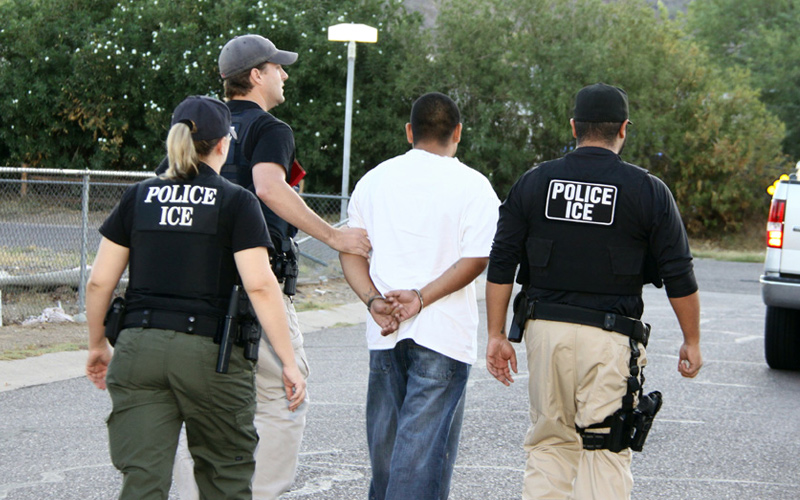The Supreme Court’s decision to annul Section 3 of the Defense of Marriage Act (DOMA) now directs U.S. Citizenship and Immigration Services (USCIS), to acknowledge that a same-sex marriage between a citizen or Lawful Permanent Resident and a noncitizen legal in the state where it was commemorated is good enough to grant immigration benefits. Under DOMA, federal agencies such as USCIS were required to accept immigration petitions only for marriages between one man and one woman, preventing same-sex couples from obtaining federal programs and other benefits accessible to opposite-sex couples.
The DOMA decision guarantees that married same-sex couples will have the same rights as conventional married couples in such areas as income tax, estate tax, health privacy and other federally regulated areas and, some may say, most importantly immigration benefits.
Under the current immigration law, family unity has been the cornerstone of U.S. immigration policy. Two-thirds of all legal immigration applications filed are family-sponsored, and about two-thirds of these cases are applications for marriage-based permanent residence. And while U.S. citizens and permanent residents have been sponsoring foreign-born spouses for green cards for decades, immigration benefits have been denied to same-sex couples for just as long.
The Court’s ruling will benefit lesbian, gay, bisexual, and transgender, or LGBT, U.S. citizens and Lawful Permanent Residents, or LPRs, in acquiring immigration visas for their spouses and thereby prevent destruction of their families. While sponsorship for a spouse’s immigration visas is an significant benefit and is crucial for protecting family unity, it is not the only federal benefit to which LGBT binational families will enjoy, other core immigration benefits will now become available to LGBT binational couples including sponsorship of a spouse’s children and prevention of domestic violence survivors from deportation, and the granting of green card for the abused spouse.
In this article we detail these newfound protections and benefits.
K -1 visas for fiancé(e)s of U.S. citizens and their children to enter quickly and K-3 for spouses of U.S. citizens and their children.
An important benefit that same-sex couples can now is the K visa, which allows fiancé(e)s and their unmarried minor children of U.S. citizens and spouses of U.S. citizens to enter the U.S. quickly in order to complete their application for permanent residency.
K visas were created to help eliminate the prolonged separation of engaged and married couples and in essence to promote family unification. Now that Section 3 of DOMA has been retracted, LGBT binational couples can be together even before their wedding and if already married can bring their spouse into the U.S. to complete the process; saving many months of separation.
Two groups of qualify to receive K visas:
U.S. citizens' fiancés who are outside the U.S. may be issued K-1 visas. Accompany minor children of these fiancés who will them to the U.S. are eligible to receive a K-2 visas.
U.S. citizens' spouses who are outside the U.S. may be issued K-3 visas. The minor children of these spouses who will accompany them to the U.S. are eligible to receive a "K-4" visa.
The objective of the K-1 visa is to permit the alien fiancé who resides outside the U.S. to travel into the U.S. to marry the citizen fiancé.
The objective of the K-3 visa is to serve as a transitory remedy for the extended delay family based immigration petition process. The K-3 visa allows the alien spouse to enter the U.S. while waiting for the result of the immigration petition. During the wait, the spouse may obtain work authorization.
Sponsoring stepchildren
U.S. Citizens and LPRs are eligible to bring their unmarried children of their spouse who are under 21 years of age to the United States following certain rules.
Before the Supreme Court’s elimination of Section 3 of DOMA, the definition of family for immigration purposes presumed all families were composed of married heterosexual couples raising biological or adopted children. But LGBT families are fashioned in numerous ways. In many cases the children may have been adopted or may be the biological children of only one spouse.
Under DOMA, the U.S. citizen or LPR spouse who was not biologically related to the child or on the adoption forms was not able to have his or her relationship to the child recognized under immigration law because his or her marriage was not recognized by the federal government.
Now that the federal government must recognize same-sex marriages, LGBT binational families have access to the same family-reunification immigration benefits as other families. With the demise of Section 3 of DOMA, U.S. citizens and LPRs who file an application for lawful permanent residence for a spouse can also do so for the spouse’s children as their own stepchildren by following certain strict guidelines.
Safe-guarding domestic violence survivors from deportation
The Violence Against Women Act, or VAWA, allows abused immigrant spouses and their children and parent to self-petition for permanent residency and receive public benefits. VAWA acknowledges the fact that an undocumented immigrant may be hesitant to leave his or her abuser due to fear of deportation. VAWA provides survivors with a of escaping violence and establishing safe, secure and self-sufficient lives.
The 2013 reauthorization of VAWA acknowledges that LGBT couples are not immune to domestic violence and included expanded services for LGBT survivors of domestic violence. It did not, however, expand the immigration protections available to abused spouses in same-sex relationships because of the DOMA definition of the term “spouse” which was restricted to opposite-sex couples by Section 3 of DOMA.
With the removal of Section 3, VAWA’s definition of spouse expands to LGBT couples. LGBT abused spouses and children of U.S. citizens and LPRs are therefore now eligible to remain in the United States even after separation from their abusers.
Enabling undocumented spouses to apply for a hardship waiver
Following Obama's victory in November, the Department of Homeland Security (DHS) acted quickly to publish a final Rule for the much-awaited application for a Provisional Waiver for undocumented immigrants. This Provisional Waiver is a God sent to the Spouse or child of a US citizen that are unable to adjust their status to a legal resident while in the U.S. because they either entered illegally. The rule covers the process of filing the Provisional Waiver on new form I-601A . Filing commenced on March 4, 2013.
The 1997 changes in the immigration laws, created a problem for many immigrants unlawfully in the United States. The law does not permit someone who entered the U.S. illegally to file their papers and then receive their Green Card without first leaving the U.S. and applying at a U.S. consulate. The law requires that if they leave the country they may not return for up to 10 years.
A hardship waiver, however, is available to shorten the time they must remain out of the U.S, before getting a green card.
Before President Obama introduced the 601A waiver, the applicant would have to wait abroad, sometimes years before they were allowed to return. Obama changed this and since March 4, 2010, the illegal spouse may wait in the United States for results of the waiver application. Once granted they travel back to their consulate but only remain abroad a few weeks before they return home to the U.S.
This is all fine for heterosexual families, but, before DOMA was gutted, undocumented LGBT immigrants married to U.S. citizens were ineligible for a waiver to shorten the time before they were eligible to reunite with their families in the United States. In fact they could not even apply for residency for their spouse. Now that marriage between LGBT undocumented immigrants and U.S. citizens or LPRs is recognized, these couples are entitled to request a hardship waiver.
Follow-to-join benefits for Children of LGBT
Some LGBT Lawful Permanent Residents who were previously married or had children before becoming LPRs and whose spouses or children did not accompany them to the United States are now entitled for follow-to-join benefits. Follow-to-join benefits that the spouse or children did not physically accompany the LPR to the United States do not have to for a visa number to become available. Instead, the LPR simply notifies that his/her family will be joining him/her and instead of waiting years to process, the family will be able to enter the U.S. in a few months. . With the annulment of Section 3 of DOMA, the marriages of same-sex couples are recognized by USCIS, and LGBT families can now be quickly reunited.
What to do if you live in a State that Bans Same-Sex Marriage?
The repeal of Section 3 of DOMA will be heralded as a milestone in LGBT litigation for equal rights, but look at the numbers.
Only 12 states allow same-sex marriages-- The number of U.S. states that permit same-sex marriage, along with the District of Columbia: Connecticut, Delaware, Iowa, Maine, Maryland, Massachusetts, New Hampshire, Minnesota, New York, Rhode Island, Vermont, and Washington.
36 States outlaw same-sex marriages -- The number of U.S. states that prohibit same-sex marriage, either through legislation or constitutional provisions.
Only 6 states allow civil unions between same-sex couples, but not marriage: Colorado, Delaware, Hawaii, Illinois, New Jersey and Rhode Island. This number will go down to four this summer after Delaware's new marriage laws take effect in July and the Rhode Island laws do on August 1. (Some states that allow civil unions also ban same-sex marriage.)
You will have to get married in a state that allows same sex marriage and then you can return to your own state to file the immigration petition, which the USCIS must accept following the repeal of Section 3 of DOMA.
`








